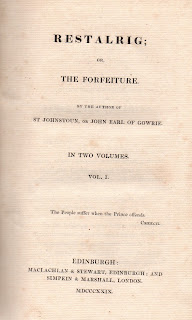It seems a long time since I read Eliza Logan's St Johnstoun (in fact, mid August last year), but I remembered, towards the end, the meeting of young Walter Restalrig with Queen Anne. I looked up the final paragraph of Chapter VIII in Volume III: Of the life and fate of the stripling who thus magnanimously secured their safety (the two remaining sons of the House of Ruthven), if this tale is not due to utter oblivion, the reader may chance to hear more at a future period; one of the remaining manuscripts in our possession, being a relation of the circumstances of his eventful life. True to her word, the author produced this tale, albeit six years had elapsed between the two works.
Several times during my reading, I felt that Eliza Logan was the contemporary author most akin to Sir Walter Scott, with all his strengths and weaknesses. She produces excellent cameos of leading real-life persons - Queen Anne again, Prince Henry, Robert Carr, Sir Robert Carey, Henry Quatre of France (warts and all), and the Duc de Sully; and life-like portraits of the lower classes - George Sprott and his sister Annie (the female clad in white), Roger Dewlap, Restalrig's loyal servant; Jasper Foster, another trusty retainer; Jacquenette, the delicious French peasant girl whom Henri lusts after.
Roger Dewlap is the only one to speak in broad Scots (thankfully, for this reader!) and his response to Restalrig's argument that he could not think of keeping followers until he regains the wherewithal is typical: O sir, ye speak till me as though I was a fremit body a'thegither, and as if ye thought I could tak siller for serving you; and I have tel't ye already that yere ain bounty and yere father (God saine him) hasna left me destitute o'means, forby the pickle siller gained lang syne, when we were allowed to harrie the biggins of the English corbies. Wonderful! Roger thoroughly deserves his place amongst the heroes of the story.
I think she trumps Sir Walter on her more realistic portrayal of women, which is not really surprising. We are introduced to the heroine, Rosa Grey, who had nearly arrived at the age of one-and-twenty, her features had much of the Grecian outline, and possessed the Italian dignity of expression, blended with a softness peculiarly their own...but Rosa is no mere cardboard cut-out and, fully-fleshed. she meets with triumph and disaster as a thoroughly believable character. Her cousin, Isabella, is not so well delineated, but still realistic. Perhaps Rosa is too much a paragon of virtue. I admit to a mild irritation over their dialogues, though - far too many No, no my pretty coz and I wot not, however!
Logan can compose some excellent, riveting scenes: such as Henri IV's attempted seduction of Jacquenette and the terrifying collapse of the tower into the mere.
But the author carries with her some of Scott's less commendable traits. She, too, goes off piste, with what appears to be padding; her sentences/paragraphs are often simply too convoluted; and she can't refrain from several purple passages. Her dwarf, Algerton, at first, veered towards the dreaded supernatural (his brother certainly thought he was in league with the devil) in addition to being the malevolent villain of the book: who appeared to have but small pretensions to claim kindred with humanity; - his body bearing no proportion in size to his limbs, from the great distortion occasioned by a prodigious hump on his back, nearly balanced by a corresponding excrescence on his breast...all due to a fall from his nurse's arms! Can one blame his misanthrope? The other black sheep, James VI and I is off-stage throughout; but the author's opinion of him has not deviated from her work of six years previously.
Logan can be charged with (repetitive) ungainliness: But we return to the son...; we shall now leave him, while we pay a visit to one of the royal palaces...; it is now, however, time to leave the cousins, while we satisfy the curiosity of the reader...; having now given this account of the brothers, we proceed to see what has become of him whose history is our theme...; we now return to honest Roger; where we shall leave them, while we relate what has meanwhile passed in England.
There is a trace of antisemitism, e.g.: many of these men seemed, from their features and dress, to be foreigners, and several of them Jews, who preyed at that time upon the vitals of the country that protected them, by undermining its laws, and robbing its more honest subjects of their property. and, the inexorable old Jew... Shylock lives? Logan also makes her views clear about the graded grains of Society. Comparing the French peasantry of the early 17th with the early 19th centuries, she wrote: We may truly say innocent, for at that day they were totally free from all those notions of equalization, by which they have been lately corrupted, and filled with the most filial regard and adorning veneration for their great monarch, and with profound respect for all those whom it had pleased God to constitute their superiors in rank and wealth. They were consequently happy and contented in their humble situations... No comment!
Wisely, Logan confined herself to two volumes rather than three; if only Sir Walter and other contemporary Scottish writers had done the same. I do wish she had written more novels, though.


No comments:
Post a Comment